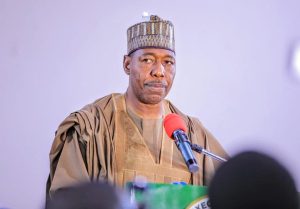 In a bid to tackle the influence of violent extremist ideologies and prevent the radicalization of young individuals by terrorist groups, Governor Babagana Zulum of Borno State has unveiled a comprehensive curriculum for Islamic schools.
In a bid to tackle the influence of violent extremist ideologies and prevent the radicalization of young individuals by terrorist groups, Governor Babagana Zulum of Borno State has unveiled a comprehensive curriculum for Islamic schools.
Borno State has been severely affected by the Boko Haram insurgency, which originated in Maiduguri in 2002.
The extremist group, known as Jamā’at Ahl as-Sunnah lid-Da’wah wa’l-Jihād, commonly referred to as Boko Haram (meaning “Western education is unlawful”), has actively opposed Western education. The sect, initially founded by the late Muhammed Yusuf and later led by Abubakar Shekarau until his reported death in 2021, has been responsible for violent attacks targeting educational institutions.
Approximately 2,500 classrooms have been destroyed, causing the displacement of hundreds of thousands of students, and the group has also engaged in the abduction of pupils.
During the unveiling ceremony held on Tuesday, Governor Zulum expressed his concern over the lack of a unified curriculum in Islamic schools for several decades. He acknowledged that the Boko Haram insurgency was fueled by misleading teachings and stressed the importance of preventing similar incidents in the future. Zulum affirmed that his administration would ensure strict adherence to the newly introduced unified curriculum across all Islamic schools. He emphasized the significance of teaching and preaching in accordance with the authentic content of the holy books.
The Governor further stated that the new curriculum was developed based on the guidelines of the National Board for Arabic and Islamic Studies. Successful completion of this curriculum will qualify students from private Islamic schools for admission into universities and colleges.
Khalifah Sheikh Ali Abulfathi, Chairman of the Arabic and Tsangaya Education Board, highlighted that the curriculum, rooted in the Maliki school of thought, focuses on the teaching of Arabic, Quran, Hadith, Tauhid, and jurisprudence. The board conducted a review of existing teaching methodologies and instructional materials used in Islamiyya schools to ensure the delivery of knowledge and values necessary for quality Islamic education.
Abulfathi called upon parents and other stakeholders to support the implementation of the new curriculum, aiming to provide every child with access to quality Islamic education.
Source: The Punch
